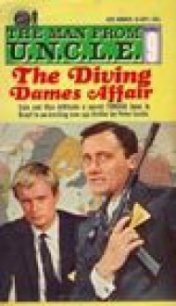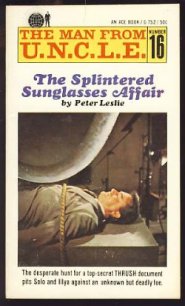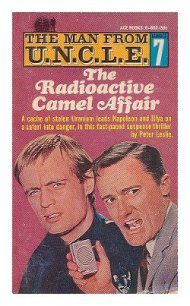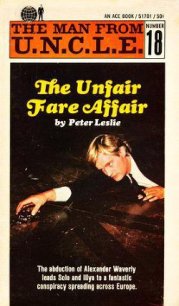The Finger in the Sky Affair - Leslie Peter (читать книги без TXT) 📗
"I may be dumb, but I'm afraid I don't quite..."
"The water, don't you see, Mr. Solo. The dampness. There were hundreds of broken bottles, thousands of these tablets, and when they tested them—just as a matter of routine, you understand, at first—they discovered that every single one of them had been hydrated; there's a chemical change when you drop these indigestion tablets in water, and in this case the change had already taken place!"
"And the—er—barometric lambs, did you say?"
"You must have seen them. All the souvenir shops stock them. Little plaster models of Bambi covered in some rough substance—when it's going to rain (that is, when the humidity is high) the lamb turns pink; if it's going to be fine, the lamb's blue. And if it's variable the thing stays a kind of mauve color."
"And the lambs in the crash were all pink?"
"As a baby's bottom! Someone noticed they'd been blue when they were loaded—and the conclusive point was that there was a drought where the plane crashed: hadn't been a drop of rain for seven weeks!"
"So neither the pink lambs nor the hydrated tummy tablets could have gotten that way at all unless there had been a lot of water around in the crash itself?"
"That's exactly it, Mr. Solo."
"It seems a fair deduction from the facts, then. You were saying earlier...about the three crashes at Nice..."
"Oh, yes. Since these were all at the airport itself, it was possible to get a one hundred per cent tally of the pieces of wreckage—and the boys were thus able to get the most complete picture possible as a basis for their deductions."
"A complete picture of the crash, you mean?"
"Yes. And the minutes leading up to it. Don't forget we have the black-box tape recordings, which preserve the dialogue between the pilot and control."
"Sure."
"Well—as you know—in each case they could find nothing, nothing whatever, wrong with anything. And since the controls were working okay, it followed that the mistakes that caused the crashes must have been made by whoever worked the controls."
"But the controls were in fact being worked by the Murchison-Spears equipment in each case?"
"That's it. Therefore the fault lay with the gear—but as you know, the gear was working perfectly, too. After the smash."
"So what we're looking for is someone or something that puts the equipment all haywire—yet leaves it okay after a crash?"
"That's what they tell me."
"Sounds crazy to me. The gear works on signals received from the ground, doesn't it—like a sort of radar? Then it adjusts the plane's controls in accordance with this information?...Right. Well, how in hell could anybody tamper with the machine so that it falsified signals from the ground—and yet, when it was tested after the crash, gave perfectly correct readings?"
"That," Maximilian Plant said with a broad smile, "is what I figured you were going to find out for us, Mr. Solo!"
Solo grinned back at him. He ran four fingers down one side of his jaw. "I don't know," he said, shaking his head; "I could understand it if the gear was just screwed up to give wrong readings and therefore fly the plane into the ground—but not when it works okay again after the crash!"
"Yes. It looks as though we're looking for something that causes some kind of temporary maladjustment, doesn't it?"
"Do you know of any technique that could do this? Does your staff? Can you think of any line of scientific inquiry that would help track down such a device—if one exists?"
Plant smiled again. "No," he said frankly. "None whatever."
"Then it looks," Solo said, "as though I'll have to take a plane to Nice to join my colleague there—the kind of sabotage your two American planes suffered can be done at any time; but the three jobs at Nice seem dependent on it being Nice. So my guess is that if we dig deep enough there, we may just come up with something."
"I hope so, young man. This government—and the British government, for that matter—would hate for there to be any more crashes like the others. And we, of course, wish our company to stay solvent!"
"Naturally, Mr. Plant. Could you give me the names of a few of your key personnel at Nice? I'll want to investigate everything concerning T.C.A. that goes on there, and of course I'll need help to steer me through the technical details when we try to work out what could have happened to these planes."
"I can do better than that. I was planning to send my confidential secretary, Miss Grossbreitner, over to Nice to see what went on there. A unit that suffers accidents is usually a unit that has something wrong with it, and I like to keep a finger on the pulse—even if it's only a distant one. Why don't you team up with her and she can show you around? She used to be with our maintenance section at Nice—that's why I'm sending her, because she knows the place so well."
"It would be a pleasure," Solo said—with feeling.
And later, in the cloistered calm of the outer office, he stopped by Helga Grossbreitner's desk and said: "Seems I'm going to have my opportunity to buy you that lunch after all! How about tomorrow at the Ciel d'Azur—on the second floor of the terminal building at Nice airport? It's got four crossed knives and forks in the Guide Michelin, so it should be good."
The girl lifted a hand to tuck a few stray hairs in place beneath the golden curve of her chignon. "It's kind of you, Mr. Solo," she said huskily, "but I'm afraid it would be impossible."
Solo tried hard to keep his eyes off the taut hemisphere profiled so agreeably by the raised arm. "I don't see why," he said.
She looked him full in the eye and smiled slowly. "Our own flight arriving at midday is booked solid," she said. "I've had to take seats on Air France Flight A.F./022—and it doesn't arrive there until ten to seven in the evening."
"Dinner then? We'll be just in time."
Helga Grossbreitner dropped her arm. She shifted slightly on her haunches. "Yes," she said. "I think I should like that..."
The agent was still grinning to himself out on Fifth Avenue. The Mustang had jolted up onto the wide sidewalk, lined itself up and begun to roar towards him before the scattering of passersby; the expressions of frozen astonishment and a single girl's scream percolated through into his conscious mind. He looked up to see the high-fronted, wide sports car bearing down upon him at what seemed a fantastic speed. His mind, suddenly in top gear, worked like lightning: there was ten yards or more to each side before he could reach the shelter of shop front, parked car, newsstand or tree. A flick of the wrist, a swerve from that high-geared steering, and he wouldn't have a chance.
He took three tremendously quick steps towards the roadway and sprang desperately upwards, his out-stretched hands reaching for an ornamental arm projecting from a light standard. As his fingers closed over the green-painted ironwork, he let the impetus of his jump carry his legs on and up, drawing his knees towards his chin like a trapezist.
Missing him by fractions of inches, the Mustang snarled past below with a scream from its highly tuned engine. Fifty yards down the sidewalk, its brake lights blazed momentarily red as it spewed, rocked into a left turn with a screech of tires, and shot through the line of parked cars by a fire-plug. It slewed sideways as it hit the main road, was expertly corrected, and accelerated away towards the river with a bellow of its twin exhausts.



![[The Girl From UNCLE 04] - The Cornish Pixie Affair - Leslie Peter (читать книги полностью без сокращений бесплатно .TXT) 📗](/uploads/posts/books/56865/56865.jpg)
